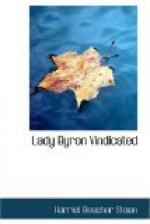Here the writer proceeds to put together all the facts of Lady Byron’s case, just as an adverse lawyer would put them as against her, and for her husband. The plea is made vigorously and ably, and with an air of indignant severity, as of an honest advocate who is thoroughly convinced that he is pleading the cause of a wronged man who has been ruined in name, shipwrecked in life, and driven to an early grave, by the arts of a bad woman,—a woman all the more horrible that her malice was disguised under the cloak of religion.
Having made an able statement of facts, adroitly leaving out ONE, {121} of which he could not have been ignorant had he studied the case carefully enough to know all the others, he proceeds to sum up against the criminal thus:—
’We would deal tenderly with the memory of Lady Byron. Few women have been juster objects of compassion. It would seem as if Nature and Fortune had vied with each other which should be most lavish of her gifts, and yet that some malignant power had rendered all their bounty of no effect. Rank, beauty, wealth, and mental powers of no common order, were hers; yet they were of no avail to secure common happiness. The spoilt child of seclusion, restraint, and parental idolatry, a fate (alike evil for both) cast her into the arms of the spoilt child of genius, passion, and the world. What real or fancied wrongs she suffered, we may never know; but those which she inflicted are sufficiently apparent.
’It is said that there are some poisons so subtle that they will destroy life, and yet leave no trace of their action. The murderer who uses them may escape the vengeance of the law; but he is not the less guilty. So the slanderer who makes no charge; who deals in hints and insinuations: who knows melancholy facts he would not willingly divulge,—things too painful to state; who forbears, expresses pity, sometimes even affection, for his victim, shrugs his shoulders, looks with
“The significant
eye,
Which learns to lie with silence,—”
is far more guilty than he who tells
the bold falsehood which may be
met and answered, and who braves
the punishment which must follow upon
detection.
’Lady Byron has been called
“The moral Clytemnestra of her lord.”
The “moral Brinvilliers” would have been a truer designation.




